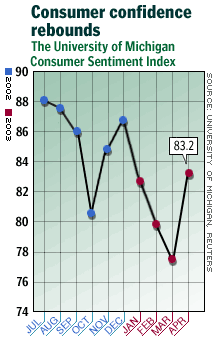NEW YORK (CNN/Money) -
In Iraq, Saddam's bronze head is being kicked all over Baghdad. In the United States, consumer sentiment and retail sales have rebounded smartly, beating economists' expectations.
Could these happy events mean a hale and hearty U.S. economy is right around the corner? Not unless the nation's businesses think so, too.
U.S. consumers, after all, are famous for their relentless spending, in response to -- or blissful avoidance of -- whatever else is going on in the world.

Staying home because of fear of terror attacks? Time to buy some new den furniture.
Lousy economy driving interest rates through the floor? Time to refinance the mortgage and buy a new SUV at zero-percent financing.
Anxious about a war in Iraq? Time to buy a big-screen TV to watch the live fire fights.
"Betting against the U.S. consumer is always a losing bet," said Anthony Chan, chief economist at Banc One Investment Advisors.
In other words, any worries about consumer fragility last month were probably overblown. Most economists think consumer spending, which makes up more than two-thirds of the total economy, will continue to hold its own after the war, keeping a recession at bay.
But if the economy is going to start putting up really decent numbers, enough to spark real improvement in the labor market, business spending is going to have to start pulling its weight -- and that's not such a sure thing.
"Before the war, consumers were doing OK, but the corporate sector didn't want to get going," said Lehman Brothers chief economist Ethan Harris. "We're back to the same environment. You see it in surveys of CEOs -- they just aren't convinced that now's the time to start expanding their business."
'Geopolitical uncertainty'
Federal Reserve Chairman Alan Greenspan and other economists have said for months that "geopolitical uncertainty" -- two-dollar words meaning, basically, "war in Iraq" -- has kept businesses sidelined, reluctant to make big investments because they had no idea what the future held.
Would the war go badly? Would there be terror attacks? Would Saddam sabotage his oil fields, driving energy prices through the roof?
| Related stories
|

|
|
|
|
Now, the war seems just about over, with the United States winning, little damage done to Iraq's oil infrastructure and not a peep out of al Qaeda. But, as you might have heard, Iraq is not the sum total of the world's uncertainties.
"We still have the problem of the occupation of Iraq, which can be very uncertain and very dangerous. We still have North Korea, the potential for terrorism elsewhere and at home and SARS," Robert Hormats, vice chairman of Goldman Sachs International, told CNNfn's Market Call.
Hormats and other economists also worry that many companies are still burdened with excess debt and production capacity after the investment boom of the late 1990s. Until these companies get their balance sheets in order, these economists worry, there won't be much incentive to spend or hire more workers.
Private U.S. payrolls are 2.6 million jobs leaner than they were in March 2001, when the National Bureau of Economic Research said a recession began. Though the recession has probably ended, about 480,000 more private jobs have been lost in the past five months.
No matter how the economy performs in the next few months, many economists say it will take time for nervous businesses to take a big hiring plunge. Instead, they seem more likely to dip their toes in the water here and there, hiring temporary workers if necessary, until they're absolutely sure the recovery is for real.
"Even after the war ends, companies will undoubtedly proceed with caution, which could keep a job-market turnaround out of reach until later this year or even into 2004," said John Challenger, CEO of outplacement firm Challenger, Gray & Christmas, which produces frequent reports on corporate layoff announcements.
If there's a silver lining to this view, however, it's that the initial slash-and-burn phase of the recovery process is probably already over. Companies probably don't have many more workers to lay off, and inventories are razor thin -- the ratio of wholesale inventories to sales has been at 1.22, the lowest level since the Commerce Department started keeping track in 1992, for three out of the past four months.
"The end of the war won't produce a starburst of economic growth, nor will it unleash a tidal wave of business spending," Paul McManus, research director at Independence Investments LLC, said in a research note Thursday. "Instead, we'll get just enough business and economic activity to keep us from slipping back into recession and to set us up for stronger growth next year."
"We're heading for a recovery, not for a double-dip."

|

